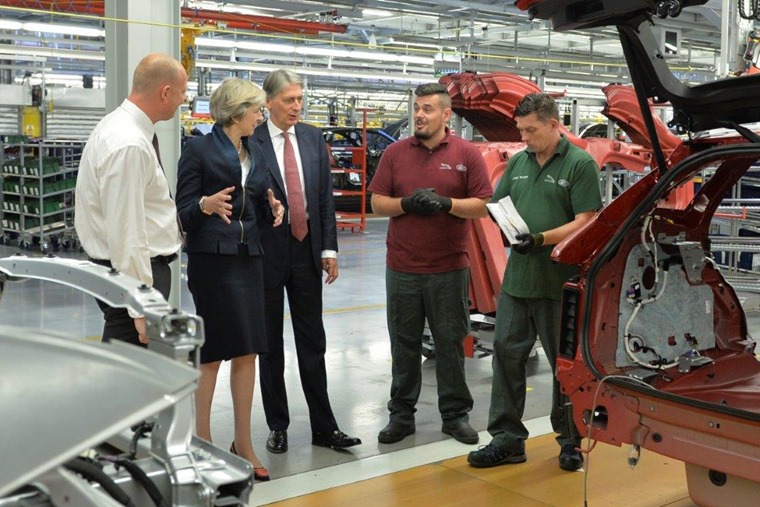Autumn Statement 2016: Fuel duty frozen and ultra-low emission vehicles escape salary sacrifice axe
Having previewed the Autumn Statement to see what effect it may have on the leasing sector, in his first Autumn Statement Phillip Hammond announced a variety of changes that will have various effects on motorists and the motoring industry.

The fact that the chancellor used to buy and sell cars in Essex and was once a young man with a taste for fast cars had given some in the industry hope that we are in good hands, and in some ways the Autumn Statement was not a complete car crash.
Shame of salary sacrificed
Bans to letting-agent fees and a rise in the minimum wage dominated headlines in the run-up to the Autumn Statement, but we were relieved at the announcement that ultra-low emission vehicles (ULEVs) have at least been saved from the big salary sacrifice axe. That said, it’s certainly not what the fleet industry was hoping for and the new system could significantly harm new car registrations.
From April 2017, most salary sacrifice schemes will effectively be scrapped and subject to the same tax as cash income, so we expect to see a rush in salary sacrifice car registrations between now and then. After April, employees will lose out on the tax perks unless the vehicle’s emissions are lower than 75g/km – for example, the Nissan Leaf, Toyota Prius Plug-In and BMW i3.
Arrangements for cars in place before April next year will be protected until April 2021.
While we fully expected salary sacrifice to be hit hard, despite campaigning from the likes of the BVRLA, at least ultra-low emission vehicles have been exempted, as well as childcare, pension, and cycle to work schemes.
Commenting on the announcement, John Pryor, Chairman of ACFO, said: “Businesses want stability and clarity and the Autumn Statement announcement just five weeks after the closure of the consultation period on the government’s proposed changes would appear to have given little time for the finite detail to be announced.
“With so many questions remaining unanswered, ACFO hopes that detailed information will be published as soon as possible so that all employers and employees can plan their future strategies and make decisions in confidence.”
What’s more, the government has pledged £390m to build on progress with ultra-low emission and connected and autonomous vehicles, including £80m for charging infrastructure and £100m on connected vehicle testing infrastructure. This is further evidence of the government’s commitment to green vehicles and making leeway in tackling emissions.
David Hosking, CEO of Tusker, commented: “The Chancellor has listened to our evidence and protected ULEVs, endorsing them in the same way as cycle to work schemes and child care vouchers.
“Car Benefit Schemes are the most affordable way to get a brand new, fully maintained and insured car, something which so many UK workers are heavily dependent on. This positive step protects hard-working basic rate tax payers, who are the overwhelming beneficiaries of Car Benefit Schemes.
Company car tax confusion?
New, lower company car tax bands will be introduced for the lowest emitting cars for 2020/21 to encourage take-up too, but it’s all quite complex.
The changes will see 15 new bandings introduced, of which 11 will be for ULEVS. From 2020, the appropriate percentages for zero emission cars will drop from 16% to 2%, while those for cars with CO2 emissions between 1g/km and 50g/km will vary between 2% and 14% depending on the number of zero-emission miles the vehicle can travel. The measure also increases appropriate percentages by 1 percentage point to a maximum value of 37% for cars with CO2 emissions of 90g/km and above. Got it?
Commenting on the changes, BVRLA Chief Executive Gerry Keaney said: “These new bandings will create a much greater incentive for employers and employees to choose the cleanest electric and hybrid cars. However, these decisions are pragmatic, cost-conscious ones and we are concerned that they may be deferred until the incentives come into effect.
“The ULEV market could suffer in the meantime as company car tax costs rise significantly between now and 2019.
“We will continue to push the government to introduce green incentives that work now rather than later. In the meantime, BVRLA members will continue to help their customers reduce their overall transport costs.”
Further fuel freeze
Elsewhere, all signs pointed to a rise in fuel duty following higher oil prices pushing petrol prices up but fuel duty remained the same yet again. This is now the longest freeze in fuel duty in 40 years.
In announcing the freeze, the chancellor said: "In total this saves the average car driver £150 a year, and the average van driver £350 a year.”
“This amounts to a tax cut worth £850m next year.”
The BVRLA welcomed the Government’s decision to freeze fuel duty for the seventh year in succession: “This decision will be welcomed by the millions of motorists and businesses for whom transport costs remain a huge burden.
“The government should give greater consideration to the evidence suggesting that a reduction in fuel duty could actually deliver a boost to the UK economy.”
Infrastructure investment and insurance increment
As predicted, £220m will also be made available by the government to relieve pinch-points on the Strategic Road Network. It is believed that most of the money will be used for cutting congestion and upgrading local roads and public transport networks.
When it comes to car insurance, it appeared to be a case of give with one hand and take with the other. While the chancellor spun news that reforms to compensation for whiplash will cut the cost of motor insurance by up to £40 per person, he also stated that insurance premium tax will rise from 10% to 12% next June. This means that in 18 months, tax on insurance will have doubled.
“(Insurance) is not a luxury but a legal requirement for drivers […] The chancellor has created the illusion of being the motorists’ friend with a freeze on fuel duty whilst pickpocketing drivers on Insurance Premium Tax,” said Edmund King, AA president.
